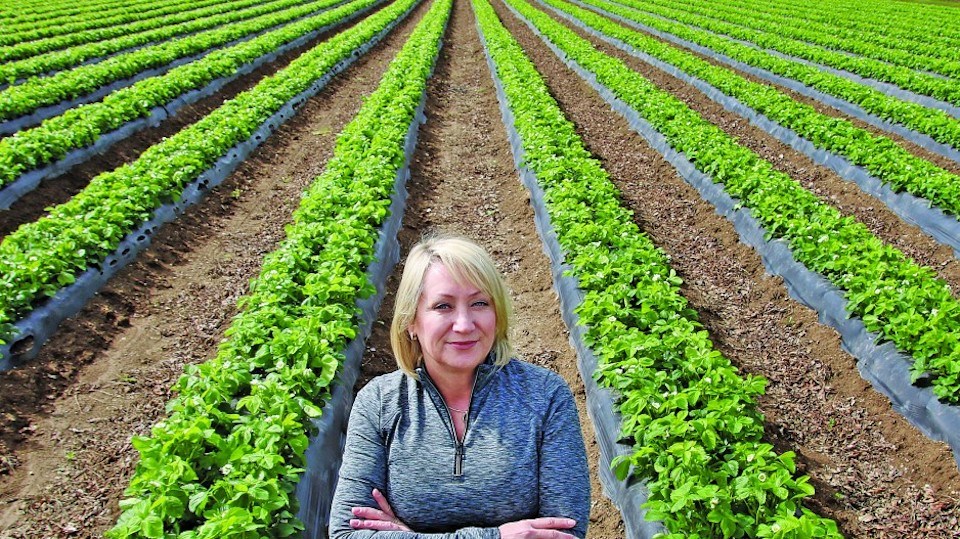The struggle to get affordable labour is crimping production and profit in B.C.’s agricultural sector.
While importing temporary foreign workers (TFWs) is easier this year than it was in 2020 and 2021, wages are rising, and farmers say they often are not able to include higher costs into the prices they charge wholesalers. Bureaucracy can also be a problem in getting foreign workers, farm owners say.
The good news for farm owners is that newly hired TFWs no longer need to quarantine for two weeks when they enter Canada, as long as the workers are vaccinated and are not displaying COVID-19 symptoms.
“The province quarantined everyone last year,” said Driediger Farms owner Rhonda Driediger. “That meant a two-week delay. You also had to pay them 60 hours of wages. Then you had to apply to the federal government to get that money reimbursed.”
Under the new process, employers are only on the hook for quarantining new foreign workers while also paying them 30 hours’ worth of wages per week if those vaccinated workers start displaying COVID-19 symptoms.
The federal government no longer reimburses employers for those wages if quarantines happen, Driediger said.
This financial risk is not there for newly hired domestic workers, although those workers can be hard to find. Employers do not need to pay domestic workers wages if they self-isolate at home with COVID-19, she told BIV.
Unfortunately for Driediger, labour costs keep rising. Minimum wages are set to rise nearly three per cent, to $15.65 per hour, on June 1. She pays transportation costs to get her TFWs to Canada from Mexico, and then pays them at least minimum wage.
Another cost is the 1.95-per-cent health tax that she has to pay on top of TFWs’ wages even though those workers are ineligible to access B.C.’s health-care system without paying for services out of their own pockets until they have been in the country six months.
The result, Driediger said, is that she pays the B.C. government $15,600 on the approximately $800,000 in annual wages that she pays her 36 TFWs for a service that they are not able to receive. These costs and increased expenses for fertilizer and other farm inputs cut into her profit because she cannot pass on the expenses, she said.
Grocers often set the prices that they will accept from suppliers, so Driediger said she has little leeway to negotiate prices with wholesale buyers.
The pushback against grocers setting prices has started to set in.
PepsiCo Inc.-owned (NYSE:PEP) Frito-Lay earlier this year temporarily halted snack shipments to Loblaw Cos. Ltd. (TSX:L) because Loblaw refused to raise those snacks’ retail prices.
It is yet to be seen if that recently resolved conflict will help Driediger's wholesale buyers negotiate higher prices with grocery chains.
Richberry Group owner Peter Dhillon said his cranberry sales to Ocean Spray largely conform to a formula that the co-operative wholesale giant uses to determine prices.
Ocean Spray then markets and sells berries from more than 700 farmers, including Dhillon, and distributes earnings to the farmers, he said.
Labour, fertilizer and other input costs are also cutting into Dhillon’s profit margin from growing cranberries on his 1,100 acres in B.C. and Quebec.
Richmond-based Dhillon, who is also chair of Ocean Spray, hires about 50 TFWs year-round and about 100 TFWs during the fall harvest. In 2020 and 2021, he had to make do with about two-thirds of that number because of the challenges involved in getting TFWs across the border.
He has tried to be innovative by investing in drones, data-analytics software and other technology.
“Last year, it was too hot,” he said. “This year it is too cold. There’s a whipsawing of weather, and we need to capture [weather] data and try to make better decisions in the future.”
He foresees farmers across B.C. shifting to have more indoor farming as a way to ensure food security.
Lenore Newman, director of the University of the Fraser Valley’s Food and Agricultural Institute agreed.
Premium B.C. strawberries – similarly sized and unblemished – have started to arrive in grocery store shelves even though Driediger said the cold spring means that B.C. strawberries grown outdoors will not be available until June – a month later than is usual. Strawberries grown indoors in B.C. are still picked by hand, but Newman said there is a global shift toward having robots pick fruit because there is a worldwide farm-worker shortage.
"We're seeing a move toward indoor strawberries, where you can actually use some mechanized labor to pick," she said. "We're seeing that developing in the Netherlands and Japan."
Robots are not as efficient at picking fruit outdoors, she said, because they do not operate as well in dirt, dust, heat and rain.
"Robots are very poorly adapted to the natural world," she said. "Mechanization works better in a much more controlled environment, where they're not getting wet or damaged."
The shift to indoor growing in increasingly sophisticated greenhouses is also happening because the climate can be controlled, resulting in higher yields that are reliable, Newman said.
Climate change makes outdoor growing increasingly risky, she added.
"Climate change and its impact on conventional farms is dramatic," Dhillon said. "It is affecting output significantly. What will help solve the problem is technology."



